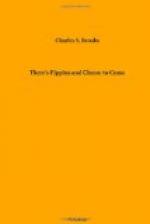The sky flames with color. Then deadens in the east. The dusk is falling. The roads grow dark. Where run the roads of night? While there is light, you can see the course they keep across the country—the dust of horses’ feet—a bridge—a vagrant winding on a hill beyond. All day long they are busy with the feet of men and women and children shouting. Then twilight comes, and the roads lead home to supper and the curling smoke above the roof. But at night where run the roads? It’s dark beyond the candle’s flare—where run the roads of night.
My brother and I have become sleepy. We lop over against my grandfather—
We awake with a start. There is a gayly lighted horse-car jingling beside us. The street lights show us into harbor. We are home at last.
The Man Of Grub Street Comes From His Garret
I have come to live this winter in New York City and by good fortune I have found rooms on a pleasant park. This park, which is but one block in extent, is so set off from the thoroughfares that it bears chiefly the traffic that is proper to the place itself. Grocery carts jog around and throw out their wares. Laundry wagons are astir. A little fat tailor on an occasion carries in an armful of newly pressed clothing with suspenders hanging. Dogs are taken out to walk but are held in leash, lest a taste of liberty spoil them for an indoor life. The center of the park is laid out with grass and trees and pebbled paths, and about it is a high iron fence. Each house has a key to the enclosure. Such social infection, therefore, as gets inside the gates is of our own breeding. In the sunny hours nurses and children air themselves in this grass plot. Here a gayly painted wooden velocipede is in fashion. At this minute there are several pairs of fat legs a-straddle this contrivance. It is a velocipede as it was first made, without pedals. Beau Brummel—for the velocipede dates back to him—may have walked forth to take the waters at Tunbridge Wells on a vehicle not far different, but built to his greater stature. There is also a trickle of drays and wagons across the park—a mere leakage from the streets, as though the near-by traffic in the pressure had burst its pipes. But only at morning and night when the city collects or discharges its people, are the sidewalks filled. Then for a half hour the nozzle of the city plays a full stream on us.
The park seems to be freer and more natural than the streets outside. A man goes by gesticulating as though he practiced for a speech. A woman adjusts her stocking on the coping below the fence with the freedom of a country road. A street sweeper, patched to his office, tunes his slow work to fit the quiet surroundings. Boys skate by or cut swirls upon the pavement in the privilege of a playground.




